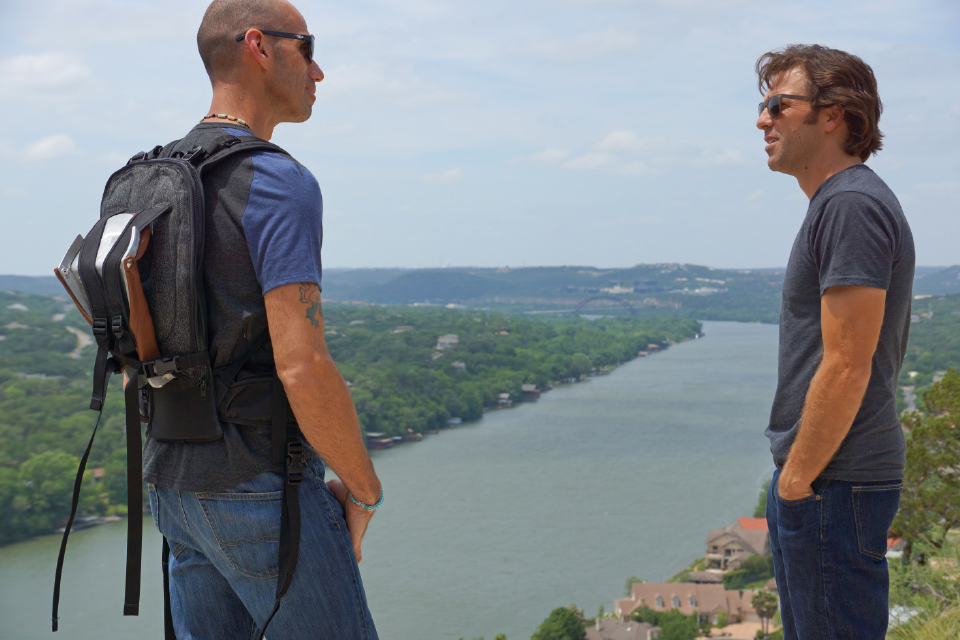Local Firefighters Turned Entrepreneurs

When a family with young children is enjoying the outdoors, there often comes a point when the little ones get tired and don’t want to walk anymore. Erick Jansen experienced this firsthand while hiking with his family in the Muir Woods, just outside of San Francisco. The family came to a fork in the road; they could either take the 1-mile loop or 3-mile loop on the Ocean Trail. They opted for the longer route, and Jansen wound up carrying his daughter for more than a mile when she tired. That experience inspired Jansen to create a modern, up-to-date child carrier—a solution to keep those little ones (and their families) enjoying the outdoors.
Once Jansen, a full-time Austin firefighter, returned from California, he reached out to fellow firefighter and good friend Nathan Jones. Jansen and Jones had bonded during rookie training and remained close friends. Both fathers and avid outdoorsmen and hikers, Jansen and Jones shared the desire to introduce those activities to their children. After Jansen explained his idea for an updated child carrier, they decided to partner to bring this product to life. “It was an easy partnership,” Jansen said. “We are both very driven.”
Jansen and Jones spent nine months testing different combinations and materials to make sure that their child carrier would be the safe and fit for the market. They tested it internally, giving it to lots of friends and taking the criticism. “We both hike a lot, so we designed [our carrier prototypes] around our hiking backpacks,” Jansen said. “We wanted to make sure we used that same technology.”
Their product, called the Freeloader, is a compact, lightweight, and portable child carrier. The carrier supports children ages 2–8 and weighing up to 80 pounds. Whether traveling, hiking, or exploring the city, the Freeloader helps free up an adult’s hands while keeping the carried child cheerful and comfortable. It’s lighter than most child carriers, and the aluminum seat folds up to the size of a daypack, making it perfect for travel and storage when not in use.
The local entrepreneurs have opted to use organic marketing (word of mouth and social media venues, such as Facebook and Twitter) to spread the story about their new product; their best advertisement has occurred through their own use of the Freeloader at area events.
Thousands of people flood Zilker Park each year for the annual Kite Festival, and it is not uncommon to park the car far away from the venue, resulting in a not-so-pleasant return trip at the end of the day. Jansen found that using the Freeloader to transport his own child after the 2014 Zilker Kite Festival made for effective advertising. “While all the other children were throwing tantrums from being tired and not wanting to walk back, my daughter was happy and smiling and sitting comfortably on my back,” Jansen said. “I was amazed by how many people stopped and asked what I was using and what the product was.”

Within 48 hours of that Kite Festival outing, Jansen and Jones had sold $6,000 worth of Freeloaders. It is now available in 15 countries and on four continents. Their next venture is to reach out to the special needs community; more than 1,000 emails have been sent from people who want to buy them for their children with mobility issues. One email came from a mother in Florida who is raising a 9-year-old boy with spinal bifida; he only weighs 70 pounds. The Freeloader has changed their life, enabling them to engage in activities that were previously off-limits in a wheelchair. “[This connection to the special needs community] has been amazing,” Jones said. “It is a big part of our market that we want to continue to develop.”
Jansen and Jones cherish the positive feedback they’re receiving from users of their product. They remain firefighters locally, but are energized by the growth and popularity of their joint business. Recently a gentleman posted snowshoeing photos on the company’s Facebook page; with the use of a Freeloader, he was able to take his toddler with him on his wintery adventure. He explained he’d always wanted to but never could, until the Freeloader made the trek possible.






